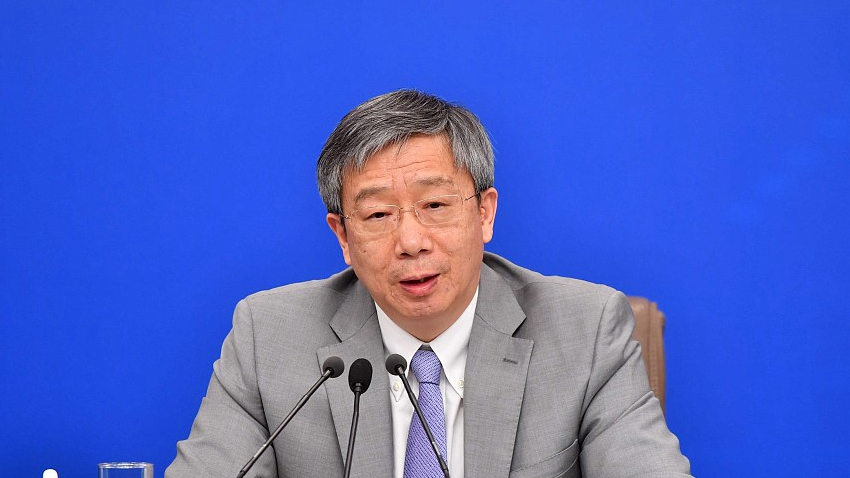
Opinion
23:15, 12-Mar-2019
How can small-and-micro enterprises benefit from monetary policy
Wang xiuyuan

Editor's note: Wang Xiuyuan is an opinion editor with CGTN. The article reflects the author's opinions, and not necessarily the views of CGTN.
Despite risks and challenges, the People's Bank of China (PBOC) cautioned that it will continue to implement a prudent policy to guide reasonable credit and financing growth in 2019.
During the Two Sessions press conference Sunday, Yi Gang, governor of the PBOC reiterated that the financial sector's support for small and micro enterprises and private enterprises has increased significantly.
One of the effective measures to help small and micro enterprises is to increase commercial banks' capital.
The reasons are obvious:
On one hand, while current commercial banks' capital adequacy ratios have met the regulatory requirement, they still face pressure in the long term.
According to the China Banking and Insurance Regulatory Commission (CBIRC) figures, by the end of 2018, the Chinese banks' capital adequacy ratio was 14.02 percent and their tier-1 capital adequacy ratio was 11.58 percent. However, since the capital adequacy ratios of leading international banks stand between 15 and 20 percent, Chinese banks still have space for improvement.
On the other hand, tools available for commercial banks to replenish capital are still not enough. Currently, commercial banks mostly rely on internal channels for capital supplement, such as retained earnings.

Yi Gang, governor of the People's Bank of China answers questions at the press conference of the second session of the 13th NPC, March 10, 2019. /VCG Photo
Yi Gang, governor of the People's Bank of China answers questions at the press conference of the second session of the 13th NPC, March 10, 2019. /VCG Photo
However, when addressing the serious problem of the growth of profits slowing down, external channels such as stock issuance, preferred stocks, convertible bonds, and tier-2 capital bonds to replenish capital are mostly preferred by commercial banks.
In this case, the PBOC conducted the first central bank bill swap (CBS) operation of the year on February 20. Valued at 1.5 billion yuan (about 0.22 billion U.S. dollars) and to be due in one year, CBS will support the issuance of perpetual bonds by commercial banks to replenish capital.
The launch of CBS is a clear sign to ensure the implementation of the prudent monetary policy, which will better serve the real economy by easing the capital pressure of commercial banks because the Chinese financial system mainly relies on indirect financing where commercial banks play a major role.
After the central bank releases liquidity, if commercial banks fail to transfer the liquidity into credit granted to the real economy, the monetary policy would not be as effective as desired.
As the central bank has repeatedly emphasized that a smooth transmission of the monetary policy is crucial in tacking the difficulty and high cost of financing, the CBS will serve as a targeted solution important to ensuring that the monetary policy runs smoothly.

Pan Gongsheng, director of the State Administration of Foreign Exchange answers questions on the Central Bank Bill Swap operation at a routine State Council policy briefing, February 19, 2019. /VCG Photo
Pan Gongsheng, director of the State Administration of Foreign Exchange answers questions on the Central Bank Bill Swap operation at a routine State Council policy briefing, February 19, 2019. /VCG Photo
With appropriate capital adequacy ratios, commercial banks could lend more money to small and micro enterprises. Statistics have shown that China's new yuan-dominated loans in January are 3.23 trillion yuan (about 0.48 trillion U.S. dollars), up 328.4 billion yuan (about 48.94 billion U.S. dollars) year-on-year despite seasonal factors may be contributors to this height.
These loans are mostly short-term loans and notes. There are mounting concerns over whether the entire financial system idles as enterprises may arbitrage through notes.
"We have closely studied the structured deposit rate and the note rate," explained Yi Gang at the press conference Sunday, "on the whole, no large-scale arbitrage occurred though occasional cases exist."
"The notes in January increased for the purpose of advocating the real economy, especially the small and micro enterprises," added Pan Gongsheng, director of the State Administration of Foreign Exchange. "The arbitrage window between structured deposit rate and the note rate is limited and the increased notes shall not be considered as abnormal."
As more related policies are being put into play, China will have an increasingly sound mechanism to supplement commercial banks' capital, and the banking industry will become abler to support the real economy, especially the small and micro enterprises.
(If you want to contribute and have specific expertise, please contact us at opinions@cgtn.com.)

SITEMAP
Copyright © 2018 CGTN. Beijing ICP prepared NO.16065310-3
Copyright © 2018 CGTN. Beijing ICP prepared NO.16065310-3